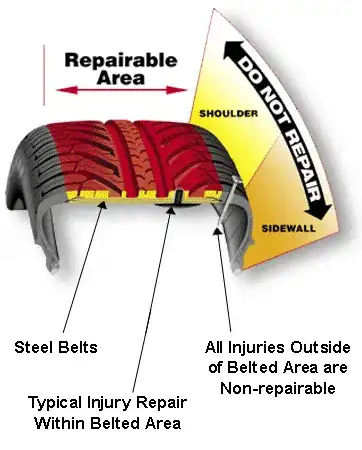(too long for a comment)
are, supposing the fix has been done properly, repaired tires in general as good as new ones. If the answer is no, then I know for sure that my specific tire at least has a chance of being unsafe, and I can have it replaced by a new one.
You are asking three different things, and I think that is the cause of the confusion here.
"As good as new" is something quite different from "safe", and still different from whether replacing the tire it is a good idea.
A repaired tire is usually not as good as a new one. If only for the fact that is has already been a used one before the repair was done. Here's one property that severely suffers by the fact that there has been a damage (although repaired): the price you can get when trying to sell it. Unfortunately, I don't have literature substantiate this claim, but here's an experiment you can conduct:
- Buy new tires, and sell them (providing the original bill) in order to determine the market value.
- Buy new tires. Drive them for a while. Sell (providing the original bill) to determine the market value.
- Buy new tires. Drive them for the same while. Take them off, puncture them with a small hole in the repairable area and have the puncture repaired. This way, the repair does not interfere with safety, and no other damage can have happened. Sell (providing the original bill and the repair bill) to determine the market value.
Surrogate experiment: call a few tire companies and ask them about the price for these 3 categories. Ask also for rationales of how they arrive at their price.
Do not forget to tell us the outcome of your experiment.
However, all this doesn't necessarily have anything to do with the actual safety of the tire. It is like asking wheter a rather new car is as good as a new one after it had an accident and the damage was properly repaired.
Personally, while I have been buying and driving used tires, I wouldn't buy repaired car/truck tires: In order to be OK with a repaired tire,
- I'd insist on personally inspecting the inside of the tire.
- I'd insist on know the history of the damage and repair
- A tire that slowly goes flat is no option.
Points 2 and 3 I cannot possibly check when buying a tire.
As for the safety, let me add to @RedGrittyBrick's excellent answer some further points about tire repair in Germany (which I consider equivalent to the linked UK rules).
So, it is possible to repair cretain tire damages safely. @RedGrittyBrick showed that before already. IMHO you cannot possibly get any further answer to the safety question.
It is easy to find evidence about the danger of improper tire repair, like this. However, I did not find any statistics on the reliability of properly done repair.
To add 3 more data points to the discussion: I've personally been driving 3 tires (light truck 2.8 t, vmax 110 km/h) that had been punctured (by something leaving < 1mm hole) on a parking and have been repaired. I never drove them at too low pressure. I've been driving then something between 25000 and 50000 km thereafter. I have to double-check but I think one of them is still "in service". The others meanwhile were replaced, but their "end" had nothing to do with that puncture or repair.
That is 0 repair-related failures out of 3 cases, which translates to a 95% confidence interval for the true probability of a failure after properly done repair between 0 and 70%. This illustrates that 3 data points do not allow much conclusions. But they are a starting point for collecting more evidence.
Last, but not least, for the third question you ask "Should I buy a new tire?", I recommend quickly calculating how much a new tire costs, and balance that againt the hours you're still going to spend on worrying about the repaired tire. Could it be that the hourly wage for your worries is very low? In that case, you may want decide to buy a new tire regardless of the technical condition of the repaired tire.
